2019英语专八改错:七类常见错误
英语专题八级改错详细介绍

常见错误类型:从句子结构
句子结构
常见错误
定语结构 比较结构 并列结构
1.在用分词做定语时,混淆现 在分词和过去分;
2.在用从句做定语时,定语从 句的先行词和关系代词使用 不当,主谓不一致
1.比较级+than结构中: 形容词的 级别,比较事物的前后一致 表比较的动词,形容词形成的比 较结构中的固定搭配,前后比 较事物的一致 as --- as
英语专题八级改错详细介绍
基本用法
可数名词 不可数名词
泛指
特指
a/an + 可数名词单数 举例:a book, an apple
零冠词+可数名词复数 举例: books, apples
the+可数名词单数/复数 举例: the book(s)
the apple(s)
零冠词+不可数名词 举例: water, sugar
• 每年涉及至少5种词类的修改; • 动词每年都有,至少一个; • 形容词副词每年至少有一个; • 冠词代词每年至少有一个(01年除外) • 2.从修改方法上看,每年10道改错题呈6,7--
-1,2---1,2的分值分布,即,修改单词6-7 个,增加单词1-2个,删除单词1-2个(2005年 除外) •
代词
1.指示代词this, that, these, those的混淆, 缺失,误用 (8-6;5-3;3-8;9-8) 2.关系代词的缺失或误用 (8-4; 7-2;5-4,7;2-5)
介词 连词
1. 介词短语,以及和动词,形容词和名词 形成的固定搭配错误 (9-6;8-1,9,10; 7-6,7; 6- 3, 5-3,4-4,3-3,10; 2-10; 1-1; 0-3, 5; 99-4)
英语专业八级改错(终稿版)
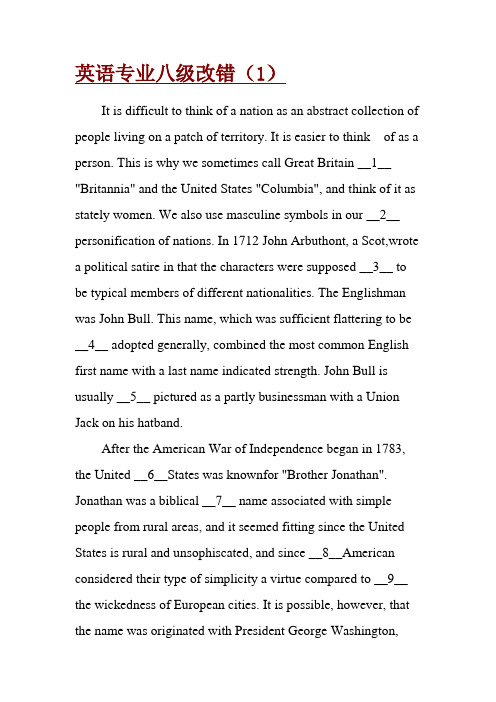
英语专业八级改错(1)It is difficult to think of a nation as an abstract collection of people living on a patch of territory. It is easier to think of as a person. This is why we sometimes call Great Britain __1__ "Britannia" and the United States "Columbia", and think of it as stately women. We also use masculine symbols in our __2__ personification of nations. In 1712 John Arbuthont, a Scot,wrote a political satire in that the characters were supposed __3__ to be typical members of different nationalities. The Englishman was John Bull. This name, which was sufficient flattering to be __4__ adopted generally, combined the most common English first name with a last name indicated strength. John Bull is usually __5__ pictured as a partly businessman with a Union Jack on his hatband.After the American War of Independence began in 1783, the United __6__States was knownfor "Brother Jonathan". Jonathan was a biblical __7__ name associated with simple people from rural areas, and it seemed fitting since the United States is rural and unsophiscated, and since __8__American considered their type of simplicity a virtue compared to __9__ the wickedness of European cities. It is possible, however, that the name was originated with President George Washington,who would __10__often say, when faced with a hard problem, "Let us consult Brother Jonathan", referring to his secrectary, Johnathan Trumbull.英语专业八级(1)答案和解析:1. of和as之间加上it.代替前文的a nation2. it—both.指代上文的US和Great Britain3. that—which4.sufficient—sufficiently.修饰形容词用副词5. indicated—indicating来源:考试大6. began—ended.根据历史知识,美国独立战争开始于1776年7月4日(《独立宣言》发表),直到1783年英国正式承认美国独立才结束。
专八改错知识点总结
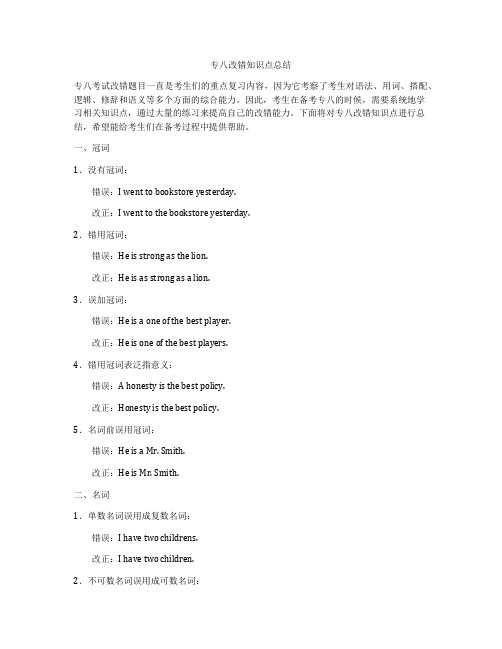
专八改错知识点总结专八考试改错题目一直是考生们的重点复习内容,因为它考察了考生对语法、用词、搭配、逻辑、修辞和语义等多个方面的综合能力。
因此,考生在备考专八的时候,需要系统地学习相关知识点,通过大量的练习来提高自己的改错能力。
下面将对专八改错知识点进行总结,希望能给考生们在备考过程中提供帮助。
一、冠词1.没有冠词:错误:I went to bookstore yesterday.改正:I went to the bookstore yesterday.2.错用冠词:错误:He is strong as the lion.改正:He is as strong as a lion.3.误加冠词:错误:He is a one of the best player.改正:He is one of the best players.4.错用冠词表泛指意义:错误:A honesty is the best policy.改正:Honesty is the best policy.5.名词前误用冠词:错误:He is a Mr. Smith.改正:He is Mr. Smith.二、名词1.单数名词误用成复数名词:错误:I have two childrens.改正:I have two children.2.不可数名词误用成可数名词:错误:We need some advices to help us.改正:We need some advice to help us.3.名词前缺少形容词:错误:She is a worker.改正:She is a hard-working worker.4.名词前误用成形容词:错误:I bought three furnitures for the new house.改正:I bought three pieces of furniture for the new house.三、代词1.误用主格代词和宾格代词:错误:Me and my friend went to the movie.改正:My friend and I went to the movie.2.误用主格代词和形容词性物主代词:错误:He is a friend of my.改正:He is a friend of mine.3.不定代词误用:错误:Does anyone disagree with me?改正:Does anyone disagree with what I say?4.人称代词误用:错误:Mary and me were at the party.改正:Mary and I were at the party.5.没有用it作形式主语:错误:To see is to believe.改正:It is to believe that is to see.四、动词1.时态误用:错误:I am knowing the truth for a long time.改正:I have known the truth for a long time. 2.语态误用:错误:The house built a few years ago.改正:The house was built a few years ago. 3.情态动词误用:错误:He can to speak English fluently.改正:He can speak English fluently.4.动词单复数误用:错误:The people in the classroom is playing.改正:The people in the classroom are playing. 5.动词后缺少宾语:错误:She enjoys.改正:She enjoys reading books.五、形容词1.错误把副词写成形容词:错误:You did so good in the test.改正:You did so well in the test.2.缺少形容词:错误:It is a idea.改正:It is a good idea.3.误用比较级:错误:He is more fatter than her.改正:He is fatter than her.【成语的替换与考查专项】要把成语说成是一个新的造词技术,也是中国人的特长,这就是成语。
专八改错重点讲解

英语专业八级改错题常见错误改错题常见错误1、名词错误。
名词单、复数用错,可数与不可数名词的混用。
例如:①We study quite a few subject, such as maths, Chinese, English and physics.?A few后面应该用复数,所以subject改为subjects。
②They were eager to know everything about China and asked me lots of question.Question为可数名词,lots of后面是复数形式,所以question改为questions③I hope that you two could come and visit us some times soon.“Times”表示次数时是可数名词,表示时间概念时是不可数名词,根据句意times应改为time。
2、时态错误:在一篇结构完整、语义连续的短文中,时态的使用也应该连贯一致,但是英语表示时间时,主句和从句时态可能不一致,却仍表明完整正确的意思。
这就要求考生准确判断句中动作的时态,培养对英语时态的敏感度。
?例如:①He can’t remember what he once knows.主句用的是一般现在时,宾语从句中有once(从前)作为明显的时间状语,因而从句中动词应用过去时knew。
②It was kind of them to meet me at the railway station and drove me to their home.“and”两边应该是平行的,“and”前面是动词原形meet,“and”后面应该也用动词原形,所以将drove改为drive。
3、语态错误在短文改错题中最常见的语态错误是被动语态被误用为主动语态。
因为汉语表达习惯上有时不加“被”字也能表示被动,因而造成考生对被动语态不敏感。
专八改错技巧总结

专八改错技巧总结引言英语专业八级考试(通称专八)是中国学术英语能力考试(CATTI)的一部分,是国内大学英语专业学生必考的考试之一。
在专八写作中,改错题是常见且重要的题型之一。
本文旨在总结一些专八改错题的解题技巧,帮助考生更好地应对。
改错题概述在专八改错题中,考生需要在一篇有错误的英语短文中,找出并改正其中的语法、拼写、标点等错误。
改错题主要测试考生对英语语法和用词的掌握程度。
以下是一些常见的改错题类型及解题技巧。
1. 代词错误代词错误是专八改错题中常见的一类错误。
考生需要注意代词的单复数、性别和格的搭配。
•技巧一:注意主谓一致。
在句子中,代词应与其前面的名词在单复数上保持一致。
•技巧二:注意代词的性别。
当代词的先行词是性别确定的名词时,代词的性别必须与之一致。
•技巧三:注意代词的格的搭配。
根据句子的逻辑关系,选择适当的代词格。
2. 动词时态错误在专八改错题中,动词时态错误也较为常见。
考生需要根据句子的语境判断动词时态是否正确。
•技巧一:注意动词主谓一致。
当主语是单数时,动词要用单数形式;当主语是复数时,动词要用复数形式。
•技巧二:注意时间状语的影响。
根据时间状语的时间表达,选择适当的动词时态。
•技巧三:注意动词的语态。
根据句子的主动或被动的意义,选择适当的动词语态。
3. 介词错误介词错误在专八改错题中也较为常见。
考生需要注意介词的正确用法。
•技巧一:注意介词和动词的搭配。
不同的动词搭配不同的介词,考生需要熟悉常见的搭配关系。
•技巧二:注意介词和名词的搭配。
不同的名词搭配不同的介词,考生需要熟悉常见的搭配关系。
•技巧三:注意介词和形容词的搭配。
不同的形容词搭配不同的介词,考生需要熟练掌握这些搭配关系。
4. 冠词错误冠词错误也是专八改错题中常见的一类错误。
考生需要注意冠词的用法。
•技巧一:注意可数名词和不可数名词的用法。
可数名词单数形式前常用不定冠词a/an,复数形式前不使用不定冠词;不可数名词前不使用不定冠词。
2019年最新-【专业英语】专八改错以及翻译,附答案-PPT课件-精选文档

翻译
• 乔羽的歌大家都熟悉。但他另外两大爱好却鲜为人知,那 就是钓鱼和喝酒。晚年的乔羽喜爱垂钓,他说:“有水有 鱼的地方大都是有好环境的,好环境便会给人好 心情。 我认为最好的钓鱼场所不是舒适的、给你准备好饿鱼的垂 钓园,而是那极其有吸引力 的大自然野外天成的场所。” 钓鱼是一项能够陶冶性情的运动,有益于身心健康。乔羽 说: “钓鱼可分三个阶段:第一阶段是吃鱼;第二阶段 是吃鱼和情趣兼而有之;第三阶段主要是 的趣,面对一 池碧水,将忧心烦恼全都抛在一边,使自己的身心得到充
• learning even our difficult English spelling. This is ‘natural’, 8.___
• therefore, that our speech-sounds should be those of our immediate circle; after all, as we have seen, speech operates as a means of holding a community and giving a sense of 9.___
• speech sounds like when we speak out, and it often comes as a 3.___
• shock when we firstly hear a recording of ourselves. It is not a 4.___
• voice we recognize at once, whereas our own handwriting is something which we almost always know. We begin the 5.___
2019
专八改错__词汇错误

2.2 代词误用
3)反身代词误用。即当主语与宾语为同一物或者 同一人的时候,宾语要用反身代词。 1998年真题:
…sometimes for weeks or even months after birth, compared with the human infant they very quickly grow the capacity to fend for them. fend for oneself 自己照料、养活自己
1999年真题:
…human ancestors consume primarily a vegetable diet supplementing with animal foods. supplement的逻辑主语是diet,是supplement的承受者。 supplementing → supplemented
2. 词汇错误
2.1 2.2 2.3 2.4 2.5 2.6 冠词误用 代词误用 非谓语动词误用 形容词与副词误用 固定搭配误用 易混淆词误用
2.3 非谓语动词误用
分词作定语时,如果分词的逻辑主语是分词所表示动 作的发出者,则用现在分词;如果逻辑主语是分词所 表示动作的承受者,则用过去分词。
1999年真题:
2. 词汇错误
2.1 2.2 2.3 2.4 2.5 2.6 冠词误用 代词误用 非谓语动词误用 形容词与副词误用 固定搭配误用 易混淆词误用
2.4 形容词与副词误用
1)形容词和副词词性误用。 2001年真题:
The marketing of wheat became an increasing favorite topic of conversation.
2.1 冠词误用
英语专八改错题常见错误

英语专八改错题常见错误1、名词错误:名词单、复数用错,可数与不可数名词的混用。
例如:①We study quite a few subject, such as maths, Chinese, English and physics.?A few后面应该用复数,所以subject改为subjects。
②They were eager to know everything about China and asked me lots of question.Question为可数名词,lots of后面是复数形式,所以question改为questions③I hope that you two could come and visit us some times soon.Times表示次数时是可数名词,表示时间概念时是不可数名词,根据句意times应改为time。
2、时态错误:在一篇结构完整、语义连续的短文中,时态的使用也应该连贯一致,但是英语表示时间时,主句和从句时态可能不一致,却仍表明完整正确的意思。
这就要求考生准确判断句中动作的时态,培养对英语时态的敏感度。
?例如:①He cant remember what he once knows.主句用的是一般现在时,宾语从句中有once(从前)作为明显的时间状语,因而从句中动词应用过去时knew。
②It was kind of them to meet me at the railway station and drove me to their home.and两边应该是平行的,and前面是动词原形meet,and后面应该也用动词原形,所以将drove改为drive。
3、语态错误在短文改错题中最常见的语态错误是被动语态被误用为主动语态。
因为汉语表达习惯上有时不加被字也能表示被动,因而造成考生对被动语态不敏感。
另外,不及物动词不能携带宾语,因而也就没有被动语态。
专八改错总结知识点

专八改错总结知识点专八考试是国内留学生考取硕士研究生学位的重要一环,对考生的英语语法、词汇、阅读理解和写作能力有着较高要求。
其中语法错误在考试中是一个很容易让考生失分的地方,因此考生在备考期间需要认真总结和复习常见的语法错误,以确保自己在考试中能够避免这些错误,提高自己的写作水平。
本文将从专八写作中常见的语法错误入手,总结知识点并给出相应的改正方法,希望对考生在备考期间有所帮助。
一、名词单复数错误名词单复数错误是专八写作中一个常见的语法错误。
考生在写作中往往容易忽略名词的单复数形式,造成语法错误。
下面列出一些常见的名词单复数错误及改正方法:1. 错误:many peoples正确:many people解析:people本身已是复数形式,不需要加s。
2. 错误:childs正确:children解析:child变为复数形式应该变为children。
3. 错误:advices正确:advice解析:advice本身已是不可数名词,不需要加s。
4. 错误:furnitures正确:furniture解析:furniture本身已是不可数名词,不需要加s。
二、冠词错误冠词错误在专八写作中也是比较常见的,一般表现为缺少冠词、冠词用错等。
下面列出一些常见的冠词错误及改正方法:1. 错误:I go to university.正确:I go to a university.解析:university属于可数名词,前面应加不定冠词a。
2. 错误:She is student.正确:She is a student.解析:student属于可数名词,前面应加不定冠词a。
3. 错误:He is expert on history.正确:He is an expert on history.解析:expert属于可数名词,前面应加不定冠词an。
三、动词时态错误动词时态错误是专八写作中较为常见的语法错误之一。
考生在写作中常常忽略动词的时态,导致语法错误。
英语专八改错可能错误分析
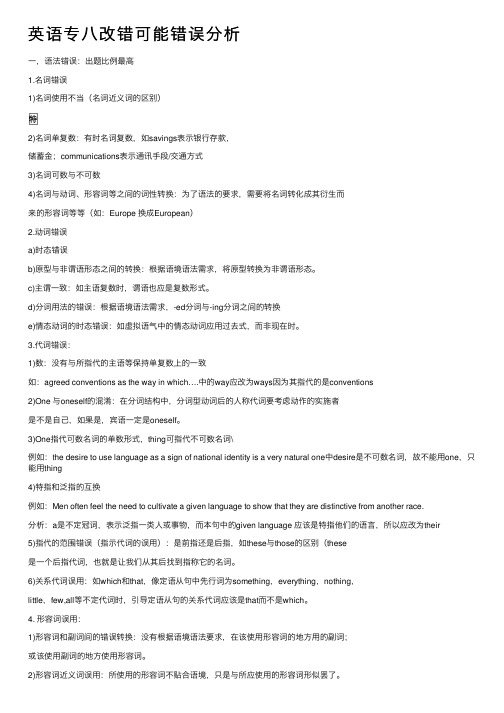
英语专⼋改错可能错误分析⼀,语法错误:出题⽐例最⾼1.名词错误1)名词使⽤不当(名词近义词的区别)2)名词单复数:有时名词复数,如savings表⽰银⾏存款,储蓄⾦;communications表⽰通讯⼿段/交通⽅式3)名词可数与不可数4)名词与动词、形容词等之间的词性转换:为了语法的要求,需要将名词转化成其衍⽣⽽来的形容词等等(如:Europe 换成European)2.动词错误a)时态错误b)原型与⾮谓语形态之间的转换:根据语境语法需求,将原型转换为⾮谓语形态。
c)主谓⼀致:如主语复数时,谓语也应是复数形式。
d)分词⽤法的错误:根据语境语法需求,-ed分词与-ing分词之间的转换e)情态动词的时态错误:如虚拟语⽓中的情态动词应⽤过去式,⽽⾮现在时。
3.代词错误:1)数:没有与所指代的主语等保持单复数上的⼀致如:agreed conventions as the way in which….中的way应改为ways因为其指代的是conventions2)One 与oneself的混淆:在分词结构中,分词型动词后的⼈称代词要考虑动作的实施者是不是⾃⼰,如果是,宾语⼀定是oneself。
3)One指代可数名词的单数形式,thing可指代不可数名词\例如:the desire to use language as a sign of national identity is a very natural one中desire是不可数名词,故不能⽤one,只能⽤thing4)特指和泛指的互换例如:Men often feel the need to cultivate a given language to show that they are distinctive from another race.分析:a是不定冠词,表⽰泛指⼀类⼈或事物,⽽本句中的given language 应该是特指他们的语⾔,所以应改为their5)指代的范围错误(指⽰代词的误⽤):是前指还是后指,如these与those的区别(these是⼀个后指代词,也就是让我们从其后找到指称它的名词。
专八短文改错题常见的错误类型
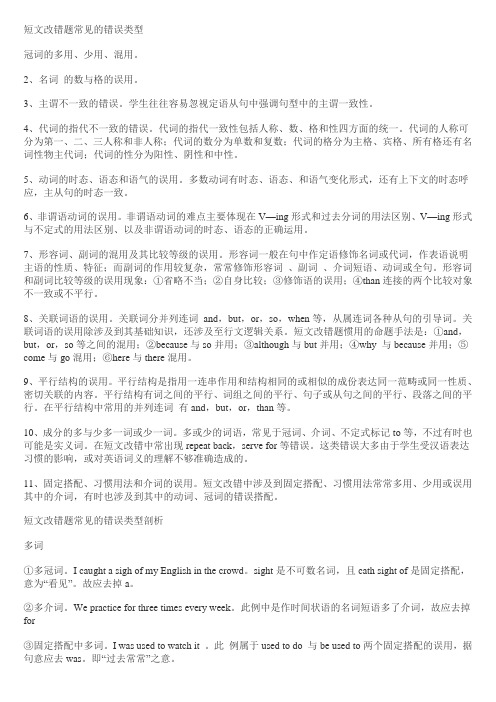
短文改错题常见的错误类型冠词的多用、少用、混用。
2、名词的数与格的误用。
3、主谓不一致的错误。
学生往往容易忽视定语从句中强调句型中的主谓一致性。
4、代词的指代不一致的错误。
代词的指代一致性包括人称、数、格和性四方面的统一。
代词的人称可分为第一、二、三人称和非人称;代词的数分为单数和复数;代词的格分为主格、宾格、所有格还有名词性物主代词;代词的性分为阳性、阴性和中性。
5、动词的时态、语态和语气的误用。
多数动词有时态、语态、和语气变化形式,还有上下文的时态呼应,主从句的时态一致。
6、非谓语动词的误用。
非谓语动词的难点主要体现在V—ing形式和过去分词的用法区别、V—ing形式与不定式的用法区别、以及非谓语动词的时态、语态的正确运用。
7、形容词、副词的混用及其比较等级的误用。
形容词一般在句中作定语修饰名词或代词,作表语说明主语的性质、特征;而副词的作用较复杂,常常修饰形容词、副词、介词短语、动词或全句。
形容词和副词比较等级的误用现象:①省略不当;②自身比较;③修饰语的误用;④than连接的两个比较对象不一致或不平行。
8、关联词语的误用。
关联词分并列连词and,but,or,so,when等,从属连词各种从句的引导词。
关联词语的误用除涉及到其基础知识,还涉及至行文逻辑关系。
短文改错题惯用的命题手法是:①and,but,or,so等之间的混用;②because与so并用;③although与but并用;④why 与because并用;⑤come与go混用;⑥here与there混用。
9、平行结构的误用。
平行结构是指用一连串作用和结构相同的或相似的成份表达同一范畴或同一性质、密切关联的内容。
平行结构有词之间的平行、词组之间的平行、句子或从句之间的平行、段落之间的平行。
在平行结构中常用的并列连词有and,but,or,than等。
10、成分的多与少多一词或少一词。
多或少的词语,常见于冠词、介词、不定式标记to等,不过有时也可能是实义词。
专八改错常见错误总结-最新

专八改错——常见错误(单词、词组)总结(注意:带—>的表示前边的是错误的,后边的是改正之后的; 其他的没有正确错误之分)1.短语搭配错误(大部分为介词错误)carry/get with things –> carry/get on with things(继续做事情)to let alone –> let alone(更不用说)the need of –> the need for(需要)substitute A with B –> substitute A for B(用A代替B)account 70% --> account for 70%(占70%)under the grounds of/that –> on the grounds of/that(以…为理由)attitude on life –> attitude towards/to life(对生活的态度)in a quick speed –> at a quick speed(以快的速度)with many respects –> in many respects(在许多方面)considerations to… –> considerations for… (考虑,顾及)resistance of –> resistance to(抵抗,抵抗,抗拒)embark sth –> embark on sth(开始着手做某事)with the belief that –> in the belief that (认为,相信)interpret… to –> interpret… as (把……理解为)in line to –> in line with (跟…一致,符合)take pride of –> take pride in(以…为傲)leap out to me –> leap out at me (出现在我眼前)inject sb sth–> inject sb with sth (给某人注射某物)charge him with the same price –> charge him the same price (收取他同样的价钱)imbalance of A and B –> imbalance between A and B(A和B的不平衡)fortify sb for sth –> fortify sb against sth (加强…以抵御…)shed light to sth –> shed light on sth(阐明某事)in proportion with –> in proportion to (与某事物成比例)pay for it with dollars –> pay for it in dollars(用美元支付)be in liberty to –> be at liberty to do sth(自由地做某事)commit an offence to –> commit an offence against sth(犯罪…罪)modern time –> modern times(现代)yearn to –> yearn for(渴望;向往)at average –> on average (平均)identify … to–> identify … with (认为… 等同于)be successful on doing –> be successful at/in doing (成功做某事)get one’s teeth on –> get one’s teeth into sth(埋头做,认真做某事)approach to do … –> approach to doing … 做某事的方法one contributor of… –> one contributor to… …的促成因素之一;consumers demand of luxury goods –> consumers demand for luxury goods (消费者对奢侈品的需求)on one’s 30s –> in one’s 30s 在某人30岁的时候balk to –> balk at (回避,绕过)differ A from B –> distinguish A from B 区分A和Bvary by – vary with… 随着…而变动emphasis of – emphasis on 强调2.易混词错误(1)形近异义词imaginative富有想象力的– imaginary想像中的,假想的adapt适应于;改编– adopt 收养;采用confirm证实; 确认– conform符合;遵照;former前者的– formal正式的diary日记– dairy乳制品personal个人的,私人的– personnel人员,员工beside在旁边– besides除…之外principal主要的– principle原理intelligent聪明的– intelligible可理解的,明白易懂的conscious有意识的– conscientious认真的stationary固定的;不动的;静止的– stationery文具considerate体贴的– considerable相当大(或多)的affect(v.影响) – effect(n.影响; v.致使、达成)contact接触– contract合同moral道德的– morale士气industrious勤劳的– industrial工业的desert沙漠– dessert甜点require要求– acquire获得– inquire询问presence存在– presentation提交;演出;sensible明智的– sensitive敏感的transformation转型– transmission传输value价值– evaluate评价tense紧张的– tension紧张anything任何事情– something某些事物cooker炊具– cook厨师;厨子complexity复杂性– complex合成体insurance 保险– assurance保证provide 提供– provided/providing假设,如果(连词)perceive理解;意识到– conceive设想;怀孕;考虑effective 有效的– affective 情感的;感情的(2)形近(形异)近义词latter后者的– later以后的;后来的late 迟的– latest 最晚的,最新的farther距离更远– further程度更进一步healthy健康的– healthful有益健康的effective有效的– efficient有效率的respectable体面的,得体的– respectful有礼貌的historic有历史意义的– historical历史的rise上升;增强;(数量)增加– arise出现;产生– raise提升;增加;养育– arouse引起;唤醒sure确信的,确实的– ensure确保– assure向…保证;使…确信in return to作为报答;反过来– in response to对…做出反应opposite对面的;相对的– opposition反对producing (produce的ing形式)– productive多产的lonely寂寞的;孤独的– alone单独的across (adv.穿过;横穿)– cross (v.横跨,穿越)permit n.通行证– permission允许;批准relating (relate的ing形式)– related有关系的memorizing (memorize的ing形式)– memorable难忘的normal(n.常态,通常标准,一般水平) – norm(规范,行为标准)favorite最喜欢的– favorable有利的;赞同的acceptability可接受性– acceptance接受economical节约的;合算的– economic经济的few很少的(修饰可数名词)– little很少的(修饰不可数名词)a few少许,有一些(修饰可数名词)– few很少的,几乎没有(修饰可数名词)little少许,有一些(修饰不可数名词)– a little 很少的,几乎没有(修饰不可数名词)invent发明,创造– discover发现before在…之前;在…以前– ago以前;之前another又一个;再一个– other其他的;别的agent 代理人– agency 代理机构special特殊的– specific具体的(3)反义词with有– without没有possible可能的– impossible不可能的subjective主观的– objective客观的import进口– export出口better更好的– worse更糟的employee雇员– employer雇主employment就业– unemployment失业modifiable可修改的– unmodifiable不可修改的natural自然的– unnatural不自然的discernable可辨别的– indiscernible难辨认的,觉察不出的lend把…借给– borrow借入;借钱,借用exclusive专用的– inclusive包括的,包罗广泛的independency独立性– dependency依靠;附属willing乐意的– unwilling不情愿的nothing more than仅仅,只不过– nothing less than完全,全部agree同意– disagree不同意rarely很少地;罕有地– frequently频繁地/ often经常specific具体的– general一般的less更少– more更多most最,最多(大)– least最少,最小known知名的;已知的– unknown不出名的;未知的respective各自的,分别的– irrespective无关的;不考虑的(irrespective of表示“不管…”) majority大多数– minority少数result in导致– result from由…引起fortunately幸运地—unfortunately不幸地powerful强大的– powerless无能的easiness容易;从容; – uneasiness不安;局促professional专业的– amateur外行的;业余的aware意识到的– unaware不知道的;未察觉到的include包括;包含– exclude排除,不包括(4) 名词单复数异义moral道德的– morals(作名词时用复数形式,表示“道德、伦理”)collection(不可数名词表示“各种因素集合体”) – collections(可数名词表示“收藏品”) manner方法,方式– manners礼仪,礼节saving – savings (复数表示“存款”)specie硬币– species种类mean(n.平均值) – means 方法(5) 易混短语live with同…一起生活,忍受– live by靠…过活go about (doing) sth开始做某事– go around四处走动tend to倾向于做…– intend to打算(做)…spend… in doing sth花费……做某事– spend… on sth 花费……在某事上die of内部的死因– die from外部的死因rather than而不是– other than除了;不同,不同于have sb do sth让某人做某事– have sth done使某事物被处理take on 从事– go on 继续take place发生– take (the) place of代替consist in存在于…– consist of 包括in all总共– after all毕竟in return作为报答– in turn反过来,轮流one reason for +短语– one reason why +句子bring out 使显露,使显现– bring up 教育,培养be worth doing值得做……– be worthwhile to do值得做……apply… to 将…应用于– apply for请求,申请3.逻辑关系错误(连词使用错误)therefore – nevertheless/however 然而(大部分therefore都要改为however,反之亦然) and和– but 但是or 或者– and 和but但是– because因为moreover此外– however然而after在…以后– before在…之前since因为– although虽然there is no…没有… – there is also… 还有…that 关系代词– if 如果,是否from now on从现在开始– from then on从那时起all全部– none没有besides此外– yet然而if如果– unless除非besides sth 此外;除sth以外, 还….(包括sth)– except sth 除了(不包括sth) therefore因此– because因为so所以– because因为so does he他也如此… – neither/nor does he…他也不that’s why +结果– that’s because +原因as if好像,似乎– even if即使4.代词错误(一致错误)their他/她/它们的– its 它的that那个– those那些(需要特别注意单复数)which – that (有些情况下关系代词只能用that)it – itself (主宾相同,宾语用反身代词)that/this – it (只有it可作形式主语)his – one’s (泛指时用one)you 你– yourself 你自己(反身代词)it 它– they 他们this 这个– such这样的XX is less sophisticated than what they are today (XX以前的样子不像现在这样老于世故.)– XX is less sophisticated than they are today (XX以前不是像现在这样老于世故的人)5.冠词错误(1)定冠词多余to large extent –> to a large extent 在很大程度上on the either side –> on either side两边in the Europe –> in Europe在欧洲in the winter –> in winter (季节前不加定冠词)Kaufman, the/an author of a recent book – Kaufman, author of a recent book(同位语间完全对等关系,不必使用冠词)take the issue –> take issue 对…持异议,不同意(2)定冠词缺漏among most –> among the mostone of first –> one of the firstatmosphere –> the atmosphere(另外还有如:the Equator,the environment, the army, the navy, the public, the Internet)between us and rest –> between us and the restin minority –> in the minorityaround floor –> around the floorpiano –> the piano (西洋乐器的前面要有定冠词)English language –> the English languageat heart of –> at the heart ofworld –> the world(表示“地球”这种独一无二的事物要加定冠词)in long run –> in the long run(3)定冠词与不定冠词之间的误用illustrate the further difference –> illustrate a further difference (第一次提及用a)6.形容词与副词使用错误have been currently –> current (系动词后接形容词)be well equipped as –> be as well equipped as (原级比较as…as)heavy industrialized –> heavily-industrialized (副词修饰形容词/动词)spread colossal –> spread colossally (副词修饰动词)similar strong –> similarly strong(副词修饰形容词)keep the number constantly at X a year –> keep the number constant at X a year (keep + n.+adj.)feel hopeless thwarted –> feel hopelessly thwarted (副词修饰形容词/动词)comparative high proportion –> comparatively high proportion(副词修饰形容词)in the passed 5 years –> in the past 5 years (固定搭配)culture embedded attitudes –> culturally embedded attitudes(副词修饰形容词)from one meter afar –> from one meter away(固定搭配)7.成分残缺或多余(单复数错误)a world which I could get… –> a world in which I could get…take for granted that –> take it for grated that1980 –1980stheir jobs engage in their interest –> their jobs engage their interest (engage单独使用表示“占用(某人时间),吸引(某人注意力)”)work sth –> work out sth解决某事believe in –believe (believe单独使用表示一般的“相信”,believe in表示“信任某人,信仰…”)20 percents –> 20 percent 百分之二十eyes contact –> eye contact 眼神接触communication service –> communications service (通信服务、通讯服务)average incomes –> average income (income为不可数名词)the like of –> the likes of (诸如此类的)be referred to XX –> be referred to as XX 被称为XXbe viewed as work of art –> be viewed as a work of art(work作为“作品”讲时,为可数名词)。
英语专业八级改错题常见错误
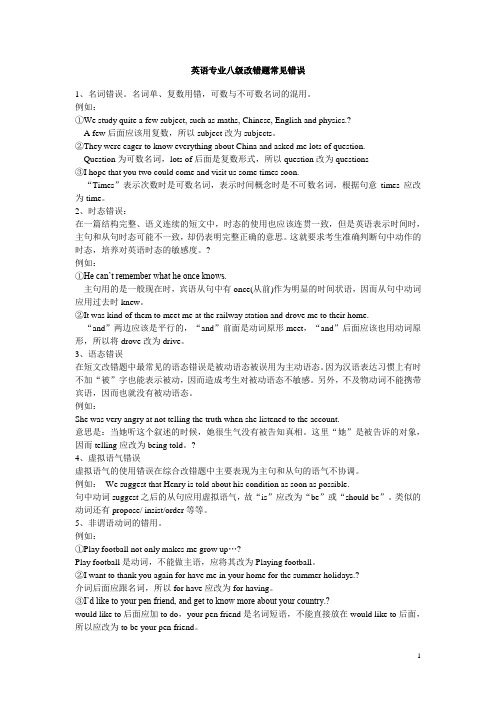
英语专业八级改错题常见错误1、名词错误。
名词单、复数用错,可数与不可数名词的混用。
例如:①We study quite a few subject, such as maths, Chinese, English and physics.?A few后面应该用复数,所以subject改为subjects。
②They were eager to know everything about China and asked me lots of question.Question为可数名词,lots of后面是复数形式,所以question改为questions③I hope that you two could come and visit us some times soon.“Times”表示次数时是可数名词,表示时间概念时是不可数名词,根据句意times应改为time。
2、时态错误:在一篇结构完整、语义连续的短文中,时态的使用也应该连贯一致,但是英语表示时间时,主句和从句时态可能不一致,却仍表明完整正确的意思。
这就要求考生准确判断句中动作的时态,培养对英语时态的敏感度。
?例如:①He can’t remember what he once knows.主句用的是一般现在时,宾语从句中有once(从前)作为明显的时间状语,因而从句中动词应用过去时knew。
②It was kind of them to meet me at the railway station and drove me to their home.“and”两边应该是平行的,“and”前面是动词原形meet,“and”后面应该也用动词原形,所以将drove改为drive。
3、语态错误在短文改错题中最常见的语态错误是被动语态被误用为主动语态。
因为汉语表达习惯上有时不加“被”字也能表示被动,因而造成考生对被动语态不敏感。
另外,不及物动词不能携带宾语,因而也就没有被动语态。
专八改错,词法错误
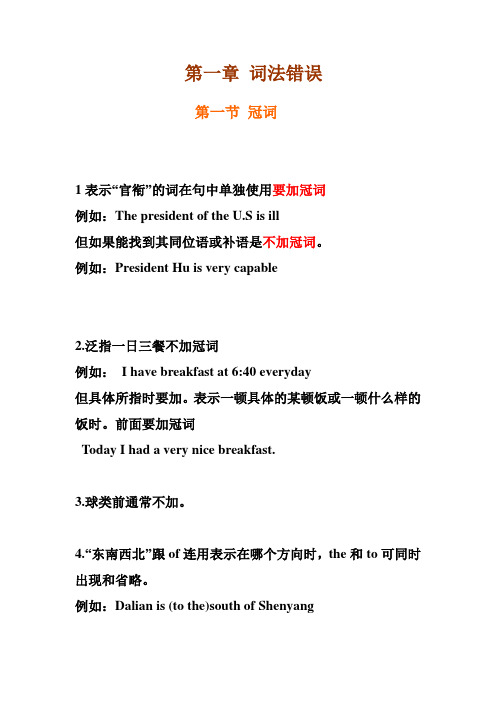
第一章词法错误第一节冠词1表示“官衔”的词在句中单独使用要加冠词例如:The president of the U.S is ill但如果能找到其同位语或补语是不加冠词。
例如:President Hu is very capable2.泛指一日三餐不加冠词例如:I have breakfast at 6:40 everyday但具体所指时要加。
表示一顿具体的某顿饭或一顿什么样的饭时。
前面要加冠词T oday I had a very nice breakfast.3.球类前通常不加。
4.“东南西北”跟of连用表示在哪个方向时,the和to可同时出现和省略。
例如:Dalian is (to the)south of Shenyang5.And连接两个名词,若表示同一个人或一套事物,通常只用一个冠词例如:The singer and dancer is excellent.若各有所指,则都用。
The singer and the dancer are excellent6.As, though引导让步状语从句,若名词提前,冠词省略。
Child as he is,...7.序数词在不表示特指的情况下,如果修饰单数可数名词,要使用不定冠词例如:He made the experiment a second time .8.另外,要牢记可数名词单数形式前要加定冠同或不定冠词;以及—些不能省略冠词的固定搭配,如:tell truth--tell the truth,all of sudden--all of a sudden.练习1. Most committee hearings are Open to public and are reported widely in the massmedia. (2004. 7)public--- the public2. The biggest cost of being in the school is foregoing income from a job... (2005. 5)in the school---in school3. ....to communicate his thoughtsand feelings, in a variety of styles, to the other English speakers. (2006. 5)the other --- other4...after more than a hundred years of a steady decline, producing the "baby boom". (2003. 2)•a -删去……sayings that manufacturing cars is the far cry from the creative nature of Hollywood’s endeavors冠词误用。
专业八级改错

常见错误类型举例
1)单个词的错误: 单个词的错误: 单个词的错误 • 词性的混用; • 名词单复数误用; • 冠词的误用; • 代词的误用; • 连接词的误用;
1. The human infant is believed to be genetic programmed in such a way that it can acquire language. 2. His politeness glues his body to the chair and refuses to let him raise.
5. Since you have got nothing specially to do in the holidays, you might as well join us in a visit to the Great Northwest. 6. The human genetic map may help us control person’s height, weight, appearance and even length of life.
3. Since he is a senior official, he ought to have known better as to accept gifts from private entrepreneurs. 4.The temporary decline in divorce did not occur in the same extent in Europe.
11. Apart from a powerful capacity to pay attention to their helplessness by using sound, there is nothing the newborn child can do to ensure his own survival. 12. His urge to go is held by his desire not be rude to his guests.
英语专八改错题九大类常考典型错误
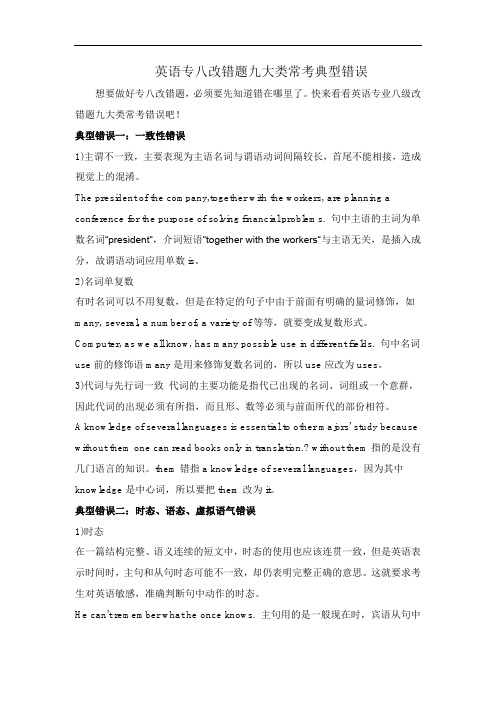
英语专八改错题九大类常考典型错误想要做好专八改错题,必须要先知道错在哪里了。
快来看看英语专业八级改错题九大类常考错误吧!典型错误一:一致性错误1)主谓不一致,主要表现为主语名词与谓语动词间隔较长,首尾不能相接,造成视觉上的混淆。
The president of the company,together with the workers, are planning a conference for the purpose of solving financial problems. 句中主语的主词为单数名词“president“,介词短语“together with the workers“与主语无关,是插入成分,故谓语动词应用单数is。
2)名词单复数有时名词可以不用复数,但是在特定的句子中由于前面有明确的量词修饰,如many, several, a number of, a variety of等等,就要变成复数形式。
Computer, as we all know, has many possible use in different fields. 句中名词use前的修饰语many是用来修饰复数名词的,所以use应改为uses。
3)代词与先行词一致代词的主要功能是指代已出现的名词、词组或一个意群,因此代词的出现必须有所指,而且形、数等必须与前面所代的部份相符。
A knowledge of several languages is essential to other majors' study because without them one can read books only in translation.? without them指的是没有几门语言的知识。
them错指a knowledge of several languages,因为其中knowledge是中心词,所以要把them改为it。
英语专业八级改错技巧

英语专业八级改错技巧英语专业八级改错技巧改错是一道基础性题目,考查的是基础语言能力,因为专八没有单项选择题(语法、词汇),所以对基础能力的考查都放在改错这一道题目上。
以下是店铺整理的英语专业八级改错技巧,欢迎阅读。
1.短语搭配错误(大部分为介词错误)carry/get with things –> carry/get on with thingsto let alone –> let alonein return to –> in return forthe need of –> the need forsubstitute A with B –> substitute A for Baccount 70% --> account for 70%under the grounds of/that –> on the grounds of/thatattitude on life –> attitude towards/to lifein a quick speed –> at a quick speedwith many respects –> in many respectsat the face of –> in the face(s) ofconsiderations to… –> considerations for…become victims of … --> become victims to …ride in a train –> ride on a trainthe problems with the government –> the problems for the government resistive against –> resistive toresistance of –> resistance toembark sth –> embark on sthwith the belief that –> in the belief thatat advance of sth –> in advance of sthinterpret… to –> interpret… asin line to –> in line withto varing degrees –> in varing degreestake pride of –> take pride inleap out to me –> leap out at meinject them lethal strains –> inject them with lethal strains –> charge him the same priceimbalance of A and B –> imbalance between A and Bshortage of protein with them –> shartage of protein among them fortify sb for sth –> fortify sb against sth (加强…以抵御…) shed light to sth –> shed light on sthin proportion with –> in proportion topay for it with dollars –> pay for it in dollarsbe in liberty to –> be at liberty tobegin at doing –> begin with doingbe contrasted to –> be contrasted withcommit an offence to –> commit an offence againstmodern time –> modern timesability of (doing) sth –> ability in (doing) sthdefend sth against –> defend sth fromat the first place –> in the first placepay money in doing –> pay money for doingtake to do –> take to doing (―求助于,开始‖,to为介词)yearn to –> yearn forat average –> on averageidentify oneself to –> identify oneself withbe successful on doing –> be successful at/in doingget one’s teeth on –> get one’s teeth into(埋头做,认真做) the action of formation –> the action of forming (of后应接动名词而非名词) approach to do … –> approach to doing …one contributor of –> one contributor toconsumers demand of luxury goods –> consumers demand for luxury goods on one’s 30s –> in one’s 30sbalk to –> balk at (回避,绕过)differ A from B –> distinguish A from B suit to sb/sth –> suit for sb/sthvary by – vary withemphasis of – emphasis on2.易混词错误(1)形近异义词imaginative – imaginaryadapt – adoptconfirm – conformformer – formaldiary – dairypersonal – personnelbeside – besidesprincipal – principleintelligent – intelligibleconscious – conscientious stationary – stationeryconsiderate – considerableaffect(影响) – effect(致使、达成) contact – contractmoral – moraleindustrious – industrialdesert – dessertrequire – acquire – inquirepresence – presentationsensible – sensitivetransformation – transmissionvalue – evaluatetense – tensionanything – somethingcooker – cookcomplexity(复杂性) – complex(合成体)insurance – assuranceprovide(提供) –provided/providing(假设,如果) perceive –conceiveeffective(有效的) – affective(受…影响的,由…引起的)(2)形近(形异)近义词latter – laterlate(迟的,已故的) – latest(最晚的,最新的)farther(距离更远) – further(程度更进一步)healthy(健康的') – healthful(有益健康的)effective – efficientcontinual(连续的) – continuous(持续不断的)respectable – respectfulhistoric – historicalrise – arise – raise – arousesure – insure – ensure – assurein return to – in response toopposite – oppositionproducing – productivelonely – aloneacross – crossimpressed -- impressivepermit(n.通行证) – permissionrelating – relatedmemorizing – memorablenormal(n.常态,通常标准,一般水平) –norm(规范,行为标准) favorite – favorableacceptability – acceptance economical – economic few – littlea few – few little – a little invent – discover before – ago another – otheragent(代理人) – agency(代理机构) reward(回馈) – award(奖赏) special – specific(3)兼有两种形式的副词firstly –first (firstly用于列举条目或者表示顺序,first表示时间上―第一次、首次‖) hardly(几乎不) – hard(努力地) sure – surely late – latelyclear(完全地、径直地) – clearly(显然、清楚地) high(高度高地) –highly(程度高地、非常) close(接近地、紧密地) – closely(紧密地、严密地) most(最) – most(大部分) (4)反义词 with – without possible –impossible subjective – objective import – export better – worse employee –employer employment –unemployment modifiable –unmodifiable natural –unnatural discernable –indiscernable lent – borrowed exclusive – inclusive independency – dependency willing – unwillingnothing more than – nothing less than agree – disagreerarely – frequently / often specific – generalless –more (still more–still less) most –least known –unknownrespective –irrespective (irrespective of表示―不管…‖) majority –minority result in –result from fortunately -- unfortunately powerful –powerless easiness –uneasiness professional – amateur aware – unaware include – exclude(5) 名词单复数异义moral – morals(作名词时用复数形式,表示―道德、伦理‖)collection(不可数名词表示―各种因素集合体‖) – collections(可数名词表示―收藏品‖) manner(方法,方式) – manners(礼仪,礼节) saving – savings(复数表示―存款‖)specie(硬币) – species(种类)(species只有单数) mean(n.平均值) – means(方法)(6) 易混短语live with(同…一起生活,忍受) – live by(靠…过活)go about (doing) sth(开始做某事,四处走动,流传,经常从事于) –go around(四处走动,绕道走)tend to – intend toin next week(以当下时间为基准点) – in the next week(以过去的时间为基准点) spend… in doing sth –spend… on sth die of(内部) – die from(外部) rather than – other than have sb do sth – have sth donetake on(从事,开始对付,呈现) – go on(继续) take place – take the place of consist in(在于) – consist of(包括) in all(总共) – after all(毕竟)in return(作为报答) – in turn(反过来,轮流) one reason for +短语– one reason why +句子bring out(使显露,使显现) – bring up(教育,培养,提出,(船)抵达目的地) be worth doing – be worthwhile to doreact to(对…作出反应) –react with(以…作出反应) apply… to(将…应用于) – apply for(请求,申请)3.逻辑关系错误(连词使用错误)therefore – nevertheless/however (大部分therefore都要改为however,反之亦然) and –but / while or –and but –because moreover – however after – before since – althoughthere is no…–there is also… that – iffrom now on –from then on all –none besides –yet if –unless besides – except therefore – because so – because so does he… –nei ther/nor does he… that’s why +结果–that’s because +原因 as if – even if whether – if4.代词错误(一致错误)their – itsthat – those (需要特别注意)which – that (有些情况下关系代词只能用that) which – whatit – itself (主宾相同,宾语用反身代词) that/this – it (只有it可作形式主语) his –one’s (泛指时用one) you – yourself it – they this – suchXX is less sophisticated than what they are today – XX is less sophisticated than they are today5.冠词错误(1)定冠词多余on the either side –> on either side in the Europe –> inEuropein the winter –> in winter (季节前不加定冠词)Kaufman, the/an author of a recent book – Kaufman, author of a recent book(同位语间完全对等关系,不必使用冠词) take the issue –> take issue(对…持异议,不同意)(2)定冠词缺漏among most –> among the most one of first –> one of the firstatmosphere –> the atmosphere(表示独一无二的事物)(另外还有如:the Equator, the Outerspace)between us and rest –> between us and the rest in minority –> in the minority around floor –> around the floorpiano –> the piano (西洋乐器的前面要有定冠词) English language –> the English language at heart of –> at the heart of world –> the world(表示―地球‖这种独一无二的事物要加定冠词) in long run –> in the long run(3)定冠词与不定冠词之间的误用illustrate the further difference –> illustrate a further difference (diference第一次提及)注意以下短语的区别 in church – in the church at college – atthe college in court – in the court in hospital – in the hospital in office – in the office in prison – in the prison at sea – at the sea in school – in the school at table – at the table6.形容词与副词使用错误have been currently –> currentbe well equipped as –> be as well equipped as heavy industrialized –> heavily-industrialized spread colossal –> spread colossally similar strong –> similarly strongkeep the number constantly at X a year –> keep number constant at X a year feel hopeless thwarted –> feel hopelessly thwartedcomparative high proportion –> comparatively high proportion (quakes) start deeply in the earth –> start deep in the earth in the passed 5 years –> in the past 5 yearsculture embedded attitudes –> culturally embedded attitudes as much as –> as often asfrom one meter afar –> from one meter away increasing –> increasingly simple –> simply pure –> purely much –> many many –> more large –> larger early –> earlier7.成分残缺或多余(单复数错误)a world which I could get… –> a world in which I could get…shows –> that shows (先行词在定语从句中作主语,关系代词不可省略) take for granted that –> take it for grated that 1980 –1980sone of the most glaring form –> one of the mist glaring formstheir jobs engage in their interest –> their jobs engage their interest (engage单独使用表示―占用(某人时间),吸引(某人注意力)‖) complain about sth –> complain sth work sth –> work out sthbelieve in –believe (believe单独使用表示一般的―相信‖,believe in表示―信任某人,信仰…‖) point sth –> point out sth 20 percents –> 20 percent eyes contact –> eye contact seven –sevenththe process which it function –> the process by which it function communication service –> communications service (通信服务、通讯服务) average incomes –> average income (income 为不可数名词) the like of –> the likes of(诸如此类的) be referred to XX –> be referred to as XXbe viewed as work of are –> be viewed as a work of art(work 作为―作品‖讲时,为可数名词)8.时态或语态错误went – go agreeing – agreed consisted – consisting bored –boring favoring – favoredif she was –> if she were(非真实条件句)involves – involving will – would (虚拟语气中)delaying – delayed (已完成概念或者被动概念)the promise of improving quality of life –> the promise of improved quality of life (已完成概念或者被动概念)assure – assures (第三人称单数) have – has (要看清句子真正的主语) developing – developed confronting – confronted the least understanding –> the least understood what the have told – what they have been toldif circumstances become favorable – if circumstances should become favorable。
专八改错套路

专八改错套路一.词汇错误:1.名词drug dependencies-drug independencies反义词,指药物依赖payment支付,报答-pay工资2.动词memorizing-memory memorize是及物动词,名词形式应该是memory,记忆力。
不要被learning and memorizing看似的并列结构忽悠了!Employing-employedCollect-collectingFocusing-focused 集中的,做动词become的表语,more focused on…3.形容词:1)形容词变名词vital-vitality2)形容词变副词significant-significantlymost很,非常-mostly主要地/通常lonely adj.孤独的-alone adv.单独地bowling alone,修饰动词bowling3)比较级、最高级older-oldgreat-greatera readiest-the readiestmore-fewer4)复合形容词fast-pace culture--fast-paced culture fast-paced=adv+v,快节奏的easy-difficultreasonable-unreasonable6)形近词excess额外/附加的-excessive过分/度的alive-live, 用错alive活着的,有活力的;live现场的;应该是live theater predictive预言的/预告的-predictable可预见的,意料之中的7)同义词Less不可数-fewer 可数fewer contacts4.副词:merely-mere mere放在不定冠词之后修饰名词a mere 18 percent of respondents 5.代词he-you 人称要一致nothing-something 反义词my-our 看清楚主语!such-so so用来代替上文中出现的内容6.冠词:in the years to come,加冠词to come是不定式短语做后置定语修饰years,years 被限定,administrators-the administrators 加冠词,题中两次提及administratorsa/an+adj+n. 是否要加不定冠词a number of 许多- the number of …的数目be doomed to,用错doomingtend to,用错attendleave work behind when they… 要加behindwe will confront elitism 删掉with confront sb/sth; confront sb. with sth; be confronted withcheck in(在旅馆、机场等)登记/报道,check做及物动词时不加in, another e-mail to checka couple of years ago 加a,a couple of表示不确定的小数目any-no by any means无论如何by no means决不/并没有no other than除…外没有/正是-other than 除…以外,此例删了nolook to us指望/依赖,要加toremove from-remove remove作vi时,与from搭配,作vt时,意为去掉,驱赶be used to+n/ving习惯于-used to+v过去常常二.语篇错误:with-despite,表让步的介词therefore-however 逻辑关系and-but转折关系but-and并列关系whereas-but whereas一般出现在句中,不单独成句,表示后分句对前分句的转折before-after三.语法错误:被动语态:they had all been checked out漏了beenhas been privileged 漏了beenit is understood more widely than…被动,不用现在分词,…被理解得更加广泛倒装句:not only…but also的句子要看清时态,部分倒装是用have还是doso+助动词+主语的倒装形式,助动词要与前一句谓语保持一致as-nor/neither ,as是表示肯定的结构,nor/neither表示否定的结构4.and-or 举例说明的句子,前有whether,后用or5.时态人称数要一致holds-holdthreaten-threatens6.形式主语itit is more likely that… 不是there be 结构,that 引导主语从句,后面是主语,it是形式主语this-it this不能做形式主语7.从句Which-that 宾从中引导词不充当任何成分,应用thatwhich-where 表语从句中,引导词在句中作状语,用连接副词where引导。
英语专业八级必看-综合改错

8. Albert, along with his three brothers, often comes to help my sister and I when the grapes are to be picked. 9. Many of the arguments used for the study of literature as a school subject are valid for study of television. 10. They asked us, Helen and me, that we thought the field of education needed new ideas and fresh leaders. 11. Never before has so many been engaged in producing goods just for the comfort of man.
Good afternoon !
有位历经专八做完了一身冷汗, 觉得真是越改越错,这个要想提高还是要靠长期积
累。时间挺长,但是改不出什么来,所以还是再多
看看后面的翻译,作文题。
结果做的时候好痛苦啊,几乎发现不了错误!!! 本来改错已经练得比较顺手了的…… 结果一对答 案,发现十行有九行的线划错了…… 这怎么让我 看得不痛苦…… 盯着一句对的句子挑错…… 叮着 一只完美的蛋啊 = = 每当我看到答案是这样时就很 无语…… 无语中的无语……
37. We sold that house at a considerately higher price than we had paid for it.
38. Maria had long had the desire to become a famous writer even though the study of it would require years of sacrifice on her part. 39. There is an army of ants sharing our lunch with us would come to my attention sooner or later. 40. America will never again have as a nation the spirit of adventure as it was before the West was settled.
- 1、下载文档前请自行甄别文档内容的完整性,平台不提供额外的编辑、内容补充、找答案等附加服务。
- 2、"仅部分预览"的文档,不可在线预览部分如存在完整性等问题,可反馈申请退款(可完整预览的文档不适用该条件!)。
- 3、如文档侵犯您的权益,请联系客服反馈,我们会尽快为您处理(人工客服工作时间:9:00-18:30)。
2019英语专八改错:七类常见错误
2017英语专八改错:七类常见错误
要提升英语专八短文改错题的水平,除了要增强基础知识的积累、提升语篇的整体理解水平之外,还应该对其错项设置的基本情况有所
了解,以便做到目标明确,有的放矢,从而提升解题的准确率。
新东
方在线专八频道从语法和逻辑的角度,向同学们介绍下英语专八改错:七类常见错误。
英语专八短文改错口诀:
动词形,名词数;注意形和副;
非谓动词细辨别;习惯用法要记住;
句子成分多分析;逻辑错误须注重。
一、动词形
主要包括两类错误:动词的时态和语态错误,以及主、谓不一致
的错误。
例如:
My favourite sport is football. I was member of our
school football team. (is)
Now my picture and prize is hanging in the library. (are)
上述两例分别属于时态错误和主、谓不一致错误。
找出此类错误
的关键是树立牢固的时态概念,注意短文内容发生或存有的时间,保
持时间概念的一致性。
二、名词数
指名词单、复数形式的用法错误。
常表现为将名词复数写成单数。
例如:…so that I’ll get good marks in all my subject. (subjects)
三、区分形和副
及区分形容词和副词在句子中的作用和具体用法。
这也是高考短文改
错的常考点。
例如:
I’m sure we’ll have a wonderfully time together. (wonderful)
Unfortunate, there are too many people in my family. (Unfortunately)
需要注意的是,形容词多用来做定、表、补语等,而副词只能在
句子中作状语,修饰动词、形容词、副词或整个句子。
第一例中的wonderful作定语修饰time,第二句的Unfortunately作状语修饰整
个句子。
四、非谓动词细辨别
这是考查最多的错误形式之一。
主要有分词和动名词类错误,也
包括不定式类错误。
例如:
…in my spare time, but now I am interest ing in football. (interested)
Play football not only makes us grow up tall and strong but also … (playing)
My parents love me… and will do all they can ∧ make sure… (to)
上述二、三例分别是动名词作主语,和不定式作目的状语。
一般的,现在分词有主动态和实行时的含义,而过去分词具有被动态和完
成时的含义,不定式有将来时态的含义。
五、习惯用法要记住
主要考查习惯搭配方面的基础知识。
这也是历年高考的常考点,
其错误表现形式主要有三种:多词、少词和搭配错误。
例如:
It was very kind for them to meet me at the railway station and… (of)
We must keep in mind that we play for the team instead
∧ ourselves. (of)
六、句子成分多分析
不同的句子成分要用不同的词类;不同的语景要选择不同的词语。
这些都有待我们对句子结构和句子成分作细致的分析,才能找出用词
不当的错误。
例如:
They ∧eager to know everything about China and… (were)
I live in Beijing, where is the capital of China. (which)
第一例漏掉了谓语动词were,这是受寒于习惯的影响而导致的错误;第二例则是词类与它在句子中的成分不相符,where是副词,不能
作主语。
七、逻辑错误须注重。
